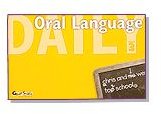Ideas to Create, Use, and Grade Daily Oral Language Sentences
How to Use and Grade DOL
Daily Oral Language sentences can be used every day in the classroom for a warm up before writers’ workshop, in the morning as students are coming in and getting settled for the day, or during a small block of time between two subjects. If you use the program from Great Source, they provide Daily Oral Language sentences that you can either write on the board or show on a transperancy.
Depending on how much time you have in your schedule, you can do these language exercises in several different ways:
1. Together as a class, students can correct the sentences, and you fix the mistakes on the board. Students tell you exactly what to fix and why, so they explain the rule. A variation of this method is for students to come to the board and fix the mistakes themselves while explaining the rules.
2. Students can write down the Daily Oral Language sentences in a notebook and fix the sentences on their own before you discuss them as a class. This method works well if you need ideas for grading Daily Oral Language. Students can correct the sentences in their notebooks in the morning; you can check these throughout the day and give them a certain number of points for each correction. At the end of the day, you can discuss the corrections as a class. Daily Oral Language sentences should be discussed orally, so grammar and punctuation rules can be reviewed.
3. You can give students Daily Oral Language worksheets, at the beginning of the week, that have five days’ sentences on them. Students correct Monday’s sentences, you collect the worksheets and grade them, and then pass them back Tuesday morning. You go over Monday’s sentences before student start correcting Tuesday’s.
Creating DOL Sentences
If you want to create your own Daily Oral Language sentences, you can tie them to something you are studying in class such as a social studies or science unit or a book you are reading. While students are correcting sentences on Daily Oral Language worksheets, they may also be reviewing facts about matter or Charlotte’s Web characters.
Before you make up your own sentences, look at your curriculum and see what types of grammar, punctuation, and capitalization rules your students should know by the end of the year. Don’t try to tackle too many rules in one week. Stick with a few–some rules that your students already know well and one or two they are learning. Remember, you can also work on spelling with Daily Oral Language sentences.
So, if you are a third grade teacher, your students know that questions end in question marks and months of the year need to be capitalized. Your students may be learning that a comma goes before a conjunction that connects two complete sentences. Here’s a Daily Oral Language sentence working on those rules:
will only my teacher be absent in april or will your teacher be absent, too
Practicing a few rules a week will help students remember these better when they are editing their own work during writers’ workshop.
